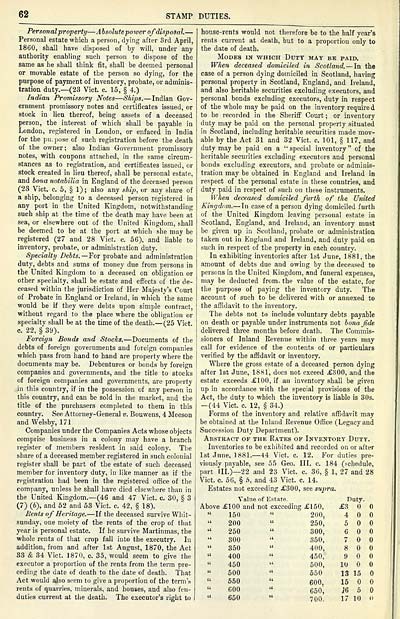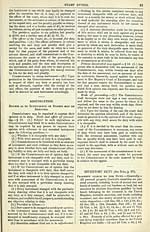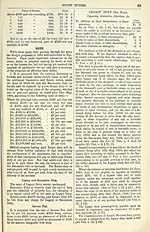Download files
Complete book:
Individual page:
Thumbnail gallery: Grid view | List view

62
STAMP DUTIES.
Personal property — Absolute power of disposal. —
Personal estate which a person, dying after 8rd April,
1860, shall have disposed of by will, under any
authority enabling such person to dispose of the
same as he shall think fit, shall be deemed personal
or movable estate of the person so dying, for the
purpose of payment of inventory, probate, or adminis-
tration duty.— (23 Vict. c. 15, § 4.)
Indian Promissory Notes — Ships. — Indian Gov-
ernment promissory notes and certificates issued, or
stock in lieu thereof, being assets of a deceased
person, the interest of which shall be payable in
London, registered in London, or enfaced in India
for the pn.pose of such registration before the death
of the owner; also Indian Government promissory
notes, with coupons attached, in the same circum-
stances as to registration, and certificates issued, or
stock created in lieu thereof, shall be personal estate,
and bona notabilia in England of the deceased person
(23 Vict. c. 5, § 1); also any sliip, or any share of
a ship, belonging to a deceased person registered in
any port in the United Kingdom, notwithstanding
such ship at the time of the death may have been at
sea, or elsewhere out of the United Kingdom, shall
be deemed to be at the port at which she may be
registered (27 and 28 Viet. c. 66), and liable to
inventory, probate, or administration duty.
Specialty Debts.— For probate and administration
duty, debts and sums of money due from persons in
the United Kingdom to a deceased on obligation or
other specialty, shall be estate and effects of the de-
ceased within the jurisdiction of Her Majesty's Court
of Probate in England or Ireland, in which the same
would be if they were debts upon simple contract,
without regard to the place where the obligation or
specialty shall be at the time of the death. — (25 Vict,
c. 22, § 39).
Foreign Bonds and Stochs. — Documents of the
debts of foreign governments and foreign companies
which pass from hand to hand are property where the
documents may be. Debentures or bonds by foreign
companies and governments, and the title to stocks
of foreign companies and governments, are property
in this country, if in the possession of any person in
this country, and can be sold in the market, and the
title of the purchasers completed to them in this
country. See Attorney-General v. Bouwens, 4 Meeson
and Welsby, 171
Companies under the Companies Acts whose objects
comprise business in a colony may have a branch
register of members resident in said colony. The
share of a deceased member registered in such colonial
register shall be part of the estate of such deceased
member for inventory duty, in like manner as if the
registration had been in the registered office of the
company, unless he shall have died elsewhere than in
the United Kingdom.— (46 and 47 Vict. c. 30, § 3
(7) (b), and 52 and 53 Vict. c. 42, § 18).
Rents of Heritage. — If the deceased survive Whit-
sunday, one moiety of the rents of the crop of that
year is personal estate. If he survive Martinmas, the
whole rents of that crop fall into the executry. In
addition, from and after 1st August, 1870, the Act
33 & 34 Vict. 1870, c. 35, would seem to give the
executor a proportion of the rents from the term pre-
ceding the date of death to the date of death. That
Act would also seem to give a proportion of the term's
rents of quarries, minerals, and houses, and also fen-
duties current at the death. The executor's right to
house-rents would not therefore be to the half year's
rents current at death, but to a proportion only to
the date of death.
Modes in which Dutt may be paid.
When deceased domiciled in Scotland. — In the
case of a person dying domiciled in Scotland, having
personal property in Scotland, England, and Ireland,
and also heritable securities excluding executors, and
personal bonds excluding executors, duty in respect
of the whole may be paid on the inventory require d
to be recorded in the Sheriff Court ; or inventory
duty may be paid on the personal property situated
in Scotland, including heritable securities made mov-
able by the Act 31 and 32 Vict. c. 101, § 117, and
duty may be paid on a ''special inventory" of the
heritable securities excluding executors and personal
bonds excluding executors, and probate or adminis-
tration may be obtained in England and Ireland in
respect of the personal estate in these countries, and
duty paid in respect of such on these instruments.
When deceased domiciled furth of the United
Kingdom. — In case of a person dying domiciled furth
of the United Kingdom leaving personal estate in
Scotland, England, and Ireland, an inventory must
be given up in Scotland, probate or administration
taken out in England and Ireland, and duty paid on
such in respect of the property in each country.
In exhibiting inventories after 1st June, 1881, the
amount of debts due and owing by the deceased to
persons in the United Kingdom, and funeral expenses,
may be deducted from, the value of the estate, for
the purpose of paying the inventory duty. The
account of such to be delivered with or annexed to
the affidavit to the inventory.
The debts not to include voluntary debts payable
on death or payable under instruments not bona fide
delivered three months before death. The Commis-
sioners of Inland Revenue within three years may
call for evidence of the contents of or particulars
verified by the affidavit or inventory.
Where the gross estate of a deceased person dying
after 1st June, 1881, docs not exceed £300, and the
estate exceeds £100, if an inventory shall be given
up in accordance with the special provisions of the
Act, the duty to which the inventory is liable is 30s.
— (44 Vict. c. 12, § 34.)
Forms of the inventory and relative affidavit may
be obtained at the Inland Revenue Office (Legacy and
Succession Duty Department).
Abstract of thk Rates of Inventory Duty.
Inventories to be exhibited and recorded on or after
1st June, 1881. — 44 Vict. c. 12. For duties pre-
viously payable, see 55 Geo. III. c. 184 (schedule,
part III.)— 22 .and 23 Vict. c. 36, § 1, 27 and 28
Vict. c. 56, § 5, and 43 Vict. c. 14.
Estates not exceeding £300, see sujjra.
Value of Est.ite. Duty.
Above £100 and not exceeding £150, £3
" 150 " 200, 4
" 200 " 250, 5
" 250 " 300, 6
" 300 " 350, 7
" 350 " 400, 8
" 400 " 450, 9
450 " 500, 10
" 500 " 550 13 15
" 660 " 600, 15
GOO " 650, i6 5
" 660 " 700. 17 10 (1
STAMP DUTIES.
Personal property — Absolute power of disposal. —
Personal estate which a person, dying after 8rd April,
1860, shall have disposed of by will, under any
authority enabling such person to dispose of the
same as he shall think fit, shall be deemed personal
or movable estate of the person so dying, for the
purpose of payment of inventory, probate, or adminis-
tration duty.— (23 Vict. c. 15, § 4.)
Indian Promissory Notes — Ships. — Indian Gov-
ernment promissory notes and certificates issued, or
stock in lieu thereof, being assets of a deceased
person, the interest of which shall be payable in
London, registered in London, or enfaced in India
for the pn.pose of such registration before the death
of the owner; also Indian Government promissory
notes, with coupons attached, in the same circum-
stances as to registration, and certificates issued, or
stock created in lieu thereof, shall be personal estate,
and bona notabilia in England of the deceased person
(23 Vict. c. 5, § 1); also any sliip, or any share of
a ship, belonging to a deceased person registered in
any port in the United Kingdom, notwithstanding
such ship at the time of the death may have been at
sea, or elsewhere out of the United Kingdom, shall
be deemed to be at the port at which she may be
registered (27 and 28 Viet. c. 66), and liable to
inventory, probate, or administration duty.
Specialty Debts.— For probate and administration
duty, debts and sums of money due from persons in
the United Kingdom to a deceased on obligation or
other specialty, shall be estate and effects of the de-
ceased within the jurisdiction of Her Majesty's Court
of Probate in England or Ireland, in which the same
would be if they were debts upon simple contract,
without regard to the place where the obligation or
specialty shall be at the time of the death. — (25 Vict,
c. 22, § 39).
Foreign Bonds and Stochs. — Documents of the
debts of foreign governments and foreign companies
which pass from hand to hand are property where the
documents may be. Debentures or bonds by foreign
companies and governments, and the title to stocks
of foreign companies and governments, are property
in this country, if in the possession of any person in
this country, and can be sold in the market, and the
title of the purchasers completed to them in this
country. See Attorney-General v. Bouwens, 4 Meeson
and Welsby, 171
Companies under the Companies Acts whose objects
comprise business in a colony may have a branch
register of members resident in said colony. The
share of a deceased member registered in such colonial
register shall be part of the estate of such deceased
member for inventory duty, in like manner as if the
registration had been in the registered office of the
company, unless he shall have died elsewhere than in
the United Kingdom.— (46 and 47 Vict. c. 30, § 3
(7) (b), and 52 and 53 Vict. c. 42, § 18).
Rents of Heritage. — If the deceased survive Whit-
sunday, one moiety of the rents of the crop of that
year is personal estate. If he survive Martinmas, the
whole rents of that crop fall into the executry. In
addition, from and after 1st August, 1870, the Act
33 & 34 Vict. 1870, c. 35, would seem to give the
executor a proportion of the rents from the term pre-
ceding the date of death to the date of death. That
Act would also seem to give a proportion of the term's
rents of quarries, minerals, and houses, and also fen-
duties current at the death. The executor's right to
house-rents would not therefore be to the half year's
rents current at death, but to a proportion only to
the date of death.
Modes in which Dutt may be paid.
When deceased domiciled in Scotland. — In the
case of a person dying domiciled in Scotland, having
personal property in Scotland, England, and Ireland,
and also heritable securities excluding executors, and
personal bonds excluding executors, duty in respect
of the whole may be paid on the inventory require d
to be recorded in the Sheriff Court ; or inventory
duty may be paid on the personal property situated
in Scotland, including heritable securities made mov-
able by the Act 31 and 32 Vict. c. 101, § 117, and
duty may be paid on a ''special inventory" of the
heritable securities excluding executors and personal
bonds excluding executors, and probate or adminis-
tration may be obtained in England and Ireland in
respect of the personal estate in these countries, and
duty paid in respect of such on these instruments.
When deceased domiciled furth of the United
Kingdom. — In case of a person dying domiciled furth
of the United Kingdom leaving personal estate in
Scotland, England, and Ireland, an inventory must
be given up in Scotland, probate or administration
taken out in England and Ireland, and duty paid on
such in respect of the property in each country.
In exhibiting inventories after 1st June, 1881, the
amount of debts due and owing by the deceased to
persons in the United Kingdom, and funeral expenses,
may be deducted from, the value of the estate, for
the purpose of paying the inventory duty. The
account of such to be delivered with or annexed to
the affidavit to the inventory.
The debts not to include voluntary debts payable
on death or payable under instruments not bona fide
delivered three months before death. The Commis-
sioners of Inland Revenue within three years may
call for evidence of the contents of or particulars
verified by the affidavit or inventory.
Where the gross estate of a deceased person dying
after 1st June, 1881, docs not exceed £300, and the
estate exceeds £100, if an inventory shall be given
up in accordance with the special provisions of the
Act, the duty to which the inventory is liable is 30s.
— (44 Vict. c. 12, § 34.)
Forms of the inventory and relative affidavit may
be obtained at the Inland Revenue Office (Legacy and
Succession Duty Department).
Abstract of thk Rates of Inventory Duty.
Inventories to be exhibited and recorded on or after
1st June, 1881. — 44 Vict. c. 12. For duties pre-
viously payable, see 55 Geo. III. c. 184 (schedule,
part III.)— 22 .and 23 Vict. c. 36, § 1, 27 and 28
Vict. c. 56, § 5, and 43 Vict. c. 14.
Estates not exceeding £300, see sujjra.
Value of Est.ite. Duty.
Above £100 and not exceeding £150, £3
" 150 " 200, 4
" 200 " 250, 5
" 250 " 300, 6
" 300 " 350, 7
" 350 " 400, 8
" 400 " 450, 9
450 " 500, 10
" 500 " 550 13 15
" 660 " 600, 15
GOO " 650, i6 5
" 660 " 700. 17 10 (1
Set display mode to: Large image | Transcription
Images and transcriptions on this page, including medium image downloads, may be used under the Creative Commons Attribution 4.0 International Licence unless otherwise stated. ![]()
| Scottish Post Office Directories > Towns > Glasgow > Post-Office annual Glasgow directory > 1894-1895 > (82) |
|---|
| Permanent URL | https://digital.nls.uk/86359022 |
|---|
| Description | Directories of individual Scottish towns and their suburbs. |
|---|
| Description | Around 700 Scottish directories published annually by the Post Office or private publishers between 1773 and 1911. Most of Scotland covered, with a focus on Edinburgh, Glasgow, Dundee and Aberdeen. Most volumes include a general directory (A-Z by surname), street directory (A-Z by street) and trade directory (A-Z by trade). |
|---|


